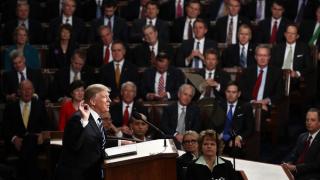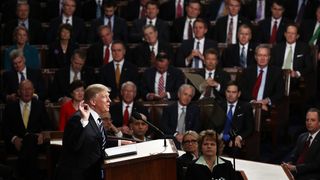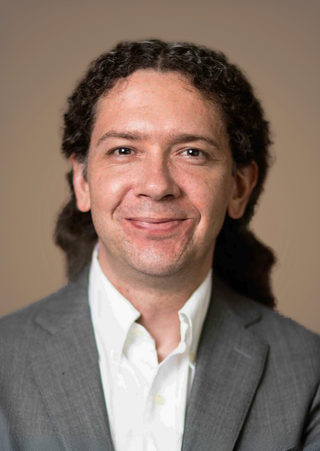Donald Trump is the first Republican in a long time to make other Republicans cheer for protectionist trade policies. But his protectionism goes much further than that. Despite the optimistic notes that bookended his speech, Trump painted a dark picture of a world in which Americans are constantly victimised. His insistence that citizens must be protected dwarfed traditional Republican themes of liberty, small government and the constitution.
The themes of yesterday's speech are familiar from Trump's 2016 campaign. The United States is near-ruined because it has allowed other countries to exploit it. American companies selling products overseas "have been mistreated for so long they have become used to it", while the government fails to protect American industries at home. He affirmed strong support for NATO but insisted allies "must pay their fair share of the cost". He promised that after "robust and frank" discussions with allies, the money is already "pouring in".

But for Trump and his supporters, immigration is the area in which Americans have been most ruthlessly exploited and victimised by outsiders: "We've defended the borders of other nations while leaving our own borders wide open, for anyone to cross – and for drugs to pour in at a now unprecedented rate."
Illegal immigration is not the only problem: "Protecting our workers also means reforming our system of legal immigration." He called for an Australian-style merit-based immigration system, claiming the current system costs taxpayers billions of dollars a year.
Trump's calls for more aggressive enforcement of immigration law culminated in the announcement of a new office called VOICE – Victims Of Immigrant Crime Engagement. He followed this with a tribute to the families of two people murdered by undocumented immigrants, describing them as "very brave Americans whose government failed them".
Trump has succeeded where other Republicans have faltered because he has a far more expansive vision of the role government should play in America. Most voters in the Midwest had never heard a presidential candidate talk about trade the way Trump does. Every politician promises those voters they will bring back dying industries, but only Trump understood the issue in the same way they do – that Americans only "win" when they are selling, not buying.
In Trump's view, if the United States can start "winning" on the world stage again and stop paying for the rest of the world's problems, there will be plenty of money for even the most ambitious national projects.
The long-standing Republican obsession with debt and deficit was forgotten. The trade deficit is what matters now. In Trump's view, if the United States can start "winning" on the world stage again and stop paying for the rest of the world's problems, there will be plenty of money for even the most ambitious national projects. His call for a trillion dollars in infrastructure spending had echoes of the New Deal, especially when coupled with the vow to "buy American and hire American". In 2016, Trump won Midwestern counties where Obama had won twice by double digits, and where Obama remains popular. Trump's speech sounded like his campaign – a right-wing version of "Yes We Can".
The President is already seeing the limits of what he can do through executive power alone. He will need the co-operation of a Republican-dominated Congress to achieve most of his plans, which are still vague. Despite the raucous applause he got from Republicans, he will face major battles over spending, healthcare and entitlement reform, where he is often at odds with Republican orthodoxy.
Trump gave some nods to that orthodoxy, promising to slash regulations everywhere, including in the Food and Drug Administration. He gave an emotional tribute to the widow of a Navy SEAL recently killed in a botched raid in Yemen, suggesting he would be happy in heaven about the length of the ensuing applause. But there was no mention of comments Trump made earlier in the day that the military was to blame for his death.
Indeed, the difference between Trump's scripted and unscripted comments is often stark. He began his address with a forceful condemnation of the "hate and evil" behind recent attacks on Jewish community centres and cemeteries. Earlier on Tuesday, however, he reportedly told state attorneys-general that the attacks could have come from "the reverse" "to make others look bad". Trump also steered clear of his usual Twitter obsessions. There was no mention of the media as "enemies of the people", nor of leaks in the intelligence community or sabotage by former members of the Obama administration.
In his most important speech so far, already earning him accolades for being unusually "presidential", Trump remained focused on his role as the unifier of the people against external threats. Tomorrow he may go back to his fixation on enemies within.






